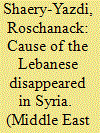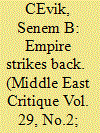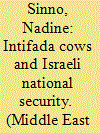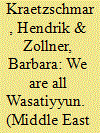|
|
|
Sort Order |
|
|
|
Items / Page
|
|
|
|
|
|
|
| Srl | Item |
| 1 |
ID:
172364


|
|
|
|
|
| Summary/Abstract |
In 1989 SOLIDE, a grass root movement from within the right wing Christian opposition to the Syrian military security emerged in order to campaign for the recovery of the disappeared. Drawing on oral history, interviews, fieldwork at SOLIDE's protest tent in downtown Beirut, and documentary analysis, I trace the genealogy and politics of SOLIDE's activism from the late 1980s to the present, showing that SOLIDE's activism underwent profound changes in response to Lebanese political developments. Beginning as an avowedly political campaign, in the aftermath of the war it turned into a human rights-focused NGO, a shift that was only possible because of an alliance with a group of the mothers of the disappeared; gender stereotyping enabled SOLIDE to present itself as fundamentally apolitical. With the establishment of a protest tent in downtown Beirut in 2005, in the period after the Syrian withdrawal until the end of its sit-in in 2015, SOLIDE took on the characteristics of a social movement. Analysis of the various phases of activism demonstrates that in Lebanon the boundaries between humanitarianism, often of religious inspiration, and human rights activism, supposedly secular, are porous, as too the boundary between party-political activism and civil society.
|
|
|
|
|
|
|
|
|
|
|
|
|
|
|
|
| 2 |
ID:
172365


|
|
|
|
|
| Summary/Abstract |
Turkish drama series aired on state network TRT (Turkish Radio and Television) connect Ottoman history with contemporary events in Turkey and have been instrumental agents in the government’s attempts to shape the political reality in accordance with its political agenda. This article examines the narrative cultivated by the popular historical drama Payitaht: Abdülhamid (2017) by using the dramatistic process framework. In doing so, it analyzes the overlapping narrative of historical and contemporary in-groups and out-groups. Payitaht: Abdülhamid recreates the current political divides on screen in Turkey by assigning guilt and redeemer statuses to certain characters in the drama series and by providing a longitudinal perspective of Turkish history. Payitaht: Abdülhamid is, therefore, a political tool used by the ruling AKP (Adalet ve Kalkınma Partisi [Justice and Development Party]) government to cultivate and propagate a worldview that connects the Ottoman past to contemporary politics. Furthermore, Payitaht: Abdülhamid feeds the existent divisions within Turkey by reinforcing the AKP’s political discourse on key domestic and foreign policy issues and helps to push its agenda to the fore.
|
|
|
|
|
|
|
|
|
|
|
|
|
|
|
|
| 3 |
ID:
172366


|
|
|
|
|
| Summary/Abstract |
The Wanted 18 narrates the story of a Palestinian town whose residents assert their autonomy by purchasing 18 cows and producing their own milk during the first intifada. In response, the Israeli military declares the cows a ‘threat to the security of Israel’ and hunts down the ‘wanted 18.’ This article provides an analysis of The Wanted 18, focusing on the human-animal interactions. It demonstrates how film directors Amer Shomali and Paul Cowan deploy animal protagonists as a means of exposing anti-Palestinian prejudice, critiquing Israeli occupation and the Palestinian authorities who undermined civil resistance during the first intifada, and elucidating the transformative impact of human-animal companionship and creative resistance in a humorous manner that appeals to a global audience.
|
|
|
|
|
|
|
|
|
|
|
|
|
|
|
|
| 4 |
ID:
172367


|
|
|
|
|
| Summary/Abstract |
Cyber technology gradually is becoming an important dimension of globalisation involving state and non-state actors. The diffusion of cyber technology has occurred in tandem with political and economic transformations resulting from the transition to neoliberalism and its associated features of privatisation and deregulation. This process of transformation is not uniform across the globe. The article analyzes how Israel’s role in the Middle East and beyond relies heavily on its private high-tech sector to recruit private companies to carry out the colonial functions of its military rule over the Palestinians, and in reshaping its relationship with some of the Arab Gulf states in their attempts to confront Iran. While at the economic level, private securitization is reaping tremendous profits, the Israeli state remains in control of the core military and political aspects of contracting out and privatising such services. However, with weak international oversight for the deployment of surveillance technology, privatisation is wreaking havoc by disrupting democratic norms and threatening civil society.
|
|
|
|
|
|
|
|
|
|
|
|
|
|
|
|
| 5 |
ID:
172362


|
|
|
|
|
| Summary/Abstract |
This paper explores the creative production of Egypt’s Choir project, a collaborative musical and theatrical group that has provided a context for youth creative, social and political expression since 2010. Drawing upon Richard Bauman’s (1984) multifaceted framework for thinking about emerging art forms, I detail the history and socio-political context of the Choir project’s activities during the period from 2011 until 2018, and engage in close literary analysis of some of its lyrical productions. Since the Choir has emerged and developed in a charged political environment, I take into account the important ways in which it has provided a context for political expression. However, I argue that detailed literary and social analysis of its creative process and production suggests that while the Project can be considered a mode of social and political expression or even resistance, it is also a profoundly creative phenomenon that produces lyrical and dramatic creations, which must be considered in their own right and which also must be understood as powerful modes of personal and even existential expression. I suggest that paying close attention to aesthetic experimentation and style adds an important dimension to our understanding of emerging art forms and the complex set of ideas that they express. Close analysis of the nature of innovative creativity also may help to explain why these forms have been so popular among audiences and the general public, even in the midst of political chaos and uncertainty about the future.
|
|
|
|
|
|
|
|
|
|
|
|
|
|
|
|
| 6 |
ID:
172363


|
|
|
|
|
| Summary/Abstract |
This article focuses on a common rhetorical referent in Egyptian public imagery and parlance–that of wasat (center) and its derivatives, wasati/wasatiyya (centrist/centrism)–and discusses how it has been appropriated and molded in the sphere of party politics. Inductive in approach, it examines the rhetorical appropriations of the center ground by party officials, revealing not only its popularity as a marker of (ideological) self-positioning but its malleability and contextuality. The article concludes that in Egyptian party politics the center positioning of parties cannot be gauged exclusively from the study of party manifestos and/or expert surveys, but ought to include contextual analysis of how this and other ideological markers are appropriated and given meaning in elite rhetoric.
|
|
|
|
|
|
|
|
|
|
|
|
|
|
|
|
|
|
|
|
|